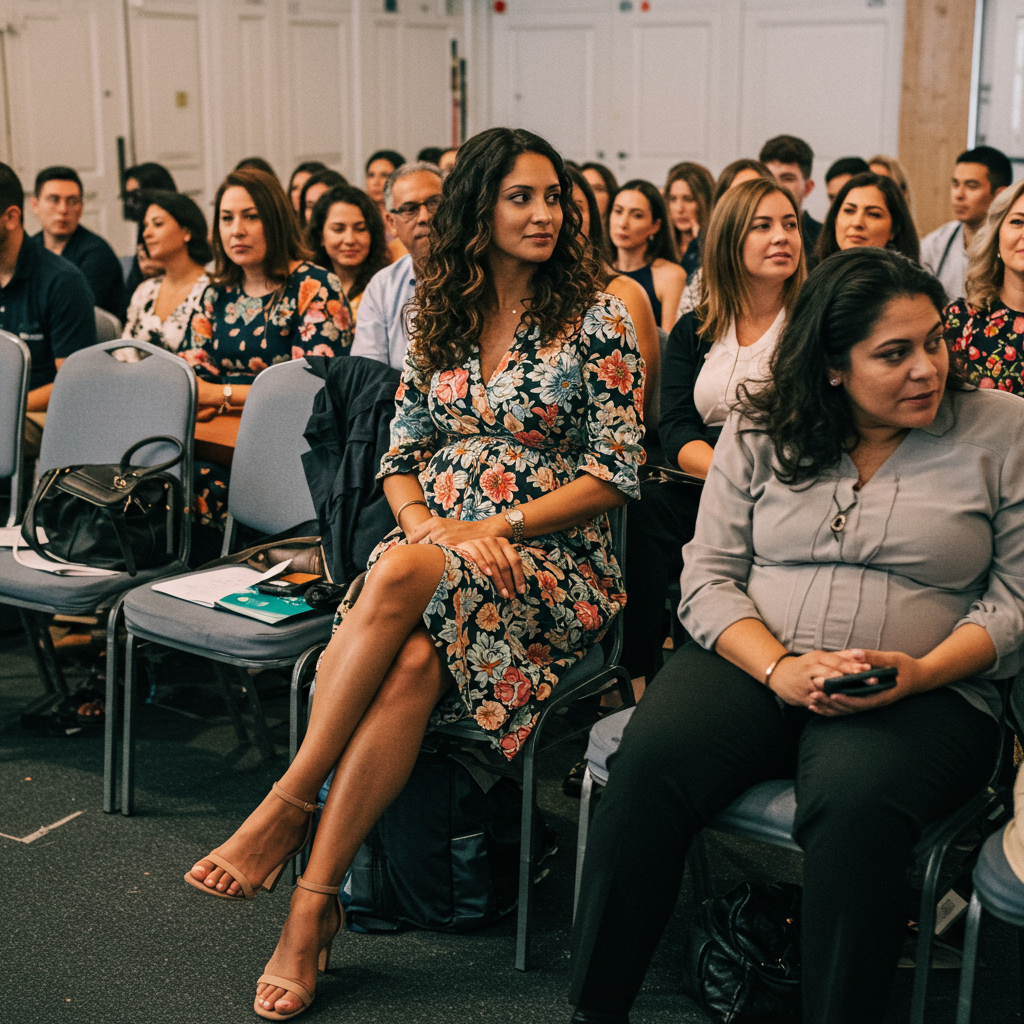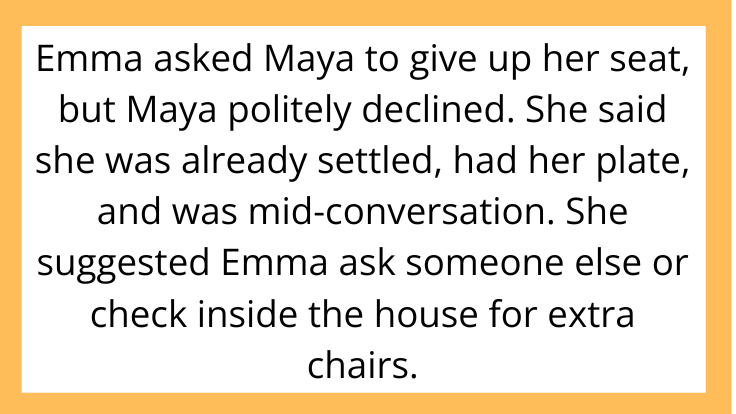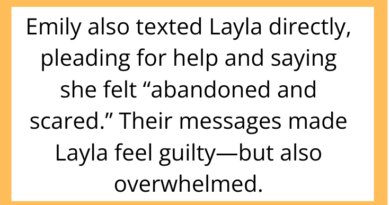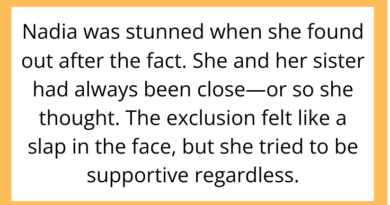AITAH for Not Giving Up My Seat for My Pregnant Sister-in-Law at a Family Dinner?
Family gatherings are often filled with laughter, stories, and—sometimes—awkward confrontations that no one sees coming. In today’s AITAH scenario, we explore a seemingly minor seating arrangement that sparked a major family feud.
Did one woman cross a line by refusing to give up her chair, or is she being unfairly labeled as selfish? Let’s break it down.
The Setup: A Packed Family Dinner and a Limited Number of Seats

Our storyteller, 26-year-old Maya, recently shared her experience on Reddit’s AITAH community. It happened during a family dinner hosted at her parents’ house. The entire extended family was invited—including Maya’s brother and his wife, who’s seven months pregnant.
Dinner was set up in the backyard, and seating was limited. Maya arrived early and chose a spot near her cousins and close friends in the family. When her pregnant sister-in-law, Emma, arrived later, there were no seats left in the shaded area.
Emma asked Maya to give up her seat, but Maya politely declined. She said she was already settled, had her plate, and was mid-conversation. She suggested Emma ask someone else or check inside the house for extra chairs.
Emma didn’t respond well. She called Maya inconsiderate, and the tension quickly escalated. By the end of the evening, Maya’s brother accused her of “disrespecting his wife” and making a pregnant woman “stand like a servant.”
Feeling blindsided and confused, Maya turned to the internet for perspective: AITAH for not giving up my seat?
The Internet Responds: Mixed Reactions with a Strong Theme

Team Maya: “Politeness Isn’t Obligation”
Plenty of users on Reddit came to Maya’s defense.
-
She got there early: Many argued that arriving early means getting first pick. It’s not rude to keep a seat you’ve claimed if it’s not reserved.
-
No one else offered: The crowd questioned why others didn’t offer their seats. Why should Maya be the only one expected to stand?
-
Not a medical emergency: Some pointed out that while pregnancy is uncomfortable, Emma wasn’t in visible distress. Asking for help is fine—expecting compliance is not.
One commenter summed it up this way:
“Being pregnant doesn’t entitle you to special treatment from everyone at all times. It’s okay to ask, but not okay to demand.”
Team Emma: “Pregnancy Deserves Courtesy”
Others felt Maya could have handled the situation with more grace.
-
Empathy matters: Emma is growing a human—standing for long periods isn’t easy. Offering your seat is a small act of kindness.
-
It’s just a chair: Some users thought Maya’s refusal sounded cold and unnecessary, especially since she could have grabbed another seat from indoors.
-
Family means going the extra mile: As one user said, “If we can’t show a little compassion to pregnant family, what are we doing?”
Let’s Talk Boundaries and Expectations

Is Chivalry Optional or Expected?
The real conflict here isn’t about a chair—it’s about expectations. Some people believe pregnancy automatically warrants certain courtesies. Others think kindness should be voluntary, not demanded.
The truth probably lies somewhere in between.
Maya’s action wasn’t rude—but her refusal might have felt hurtful to someone already dealing with the discomfort of late pregnancy. On the flip side, Emma’s reaction may have stemmed more from feeling vulnerable than feeling entitled.
The key is recognizing that kindness is most powerful when it’s given freely—not when it’s guilted out of someone.
The Family Fallout: What Happens Now?

After the dinner, Maya’s brother sent her a long text saying she should apologize. He claimed she “humiliated” Emma in front of the family.
Maya stood her ground. She said she didn’t intend to be disrespectful and was simply looking out for her own comfort. She even offered to help find better seating arrangements for the next gathering—but her brother hasn’t responded since.
So, what now?
Family conflicts like this can leave lasting tension. The best path forward might involve:
-
Private conversation: Maya and Emma could talk one-on-one to clear the air.
-
Mutual understanding: Acknowledge feelings without forcing blame.
-
Future planning: Next time, the hosts can ensure there are enough seats—and maybe even label a few for special needs.
Final Thoughts: AITAH or Just Caught in the Crossfire?

This AITAH story touches on a deeper issue: how quickly we assign blame when kindness isn’t extended in the exact way we expect.
Maya didn’t owe Emma her seat—but offering it could have been a meaningful gesture. On the other hand, Emma wasn’t wrong for asking—but expecting a yes made the ask feel like a demand.
In the end, maybe no one here is the villain. Just two people with different expectations, caught in a heated moment.



